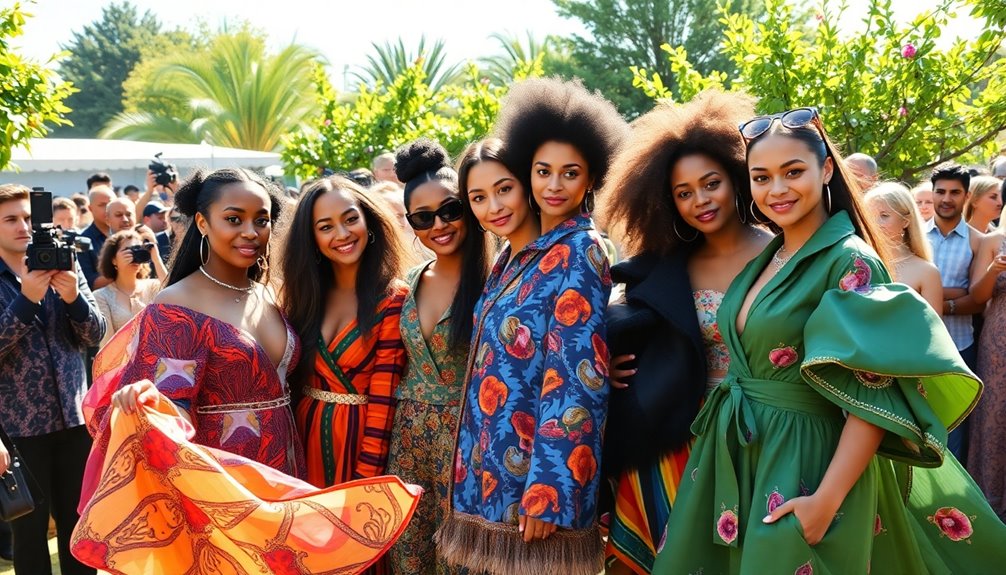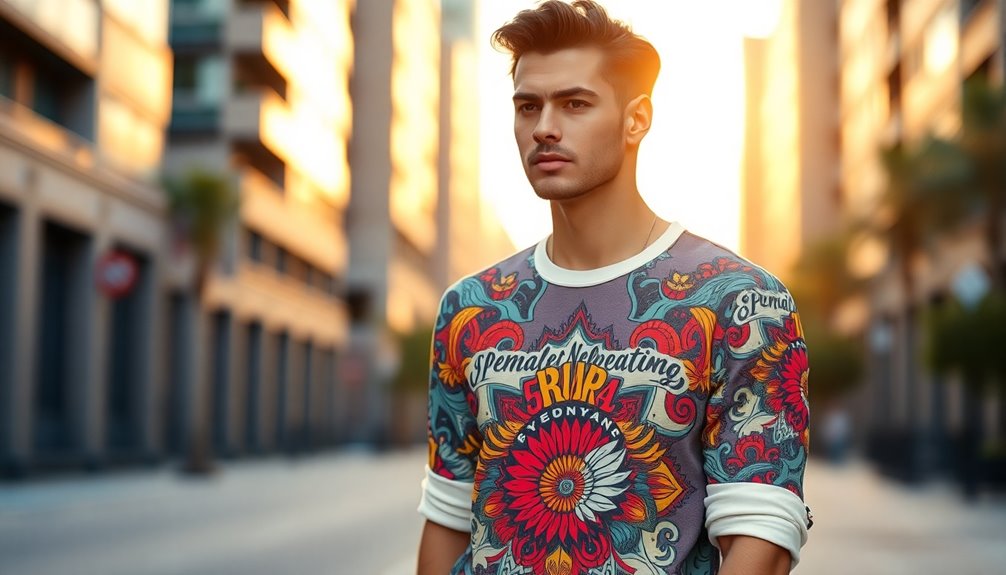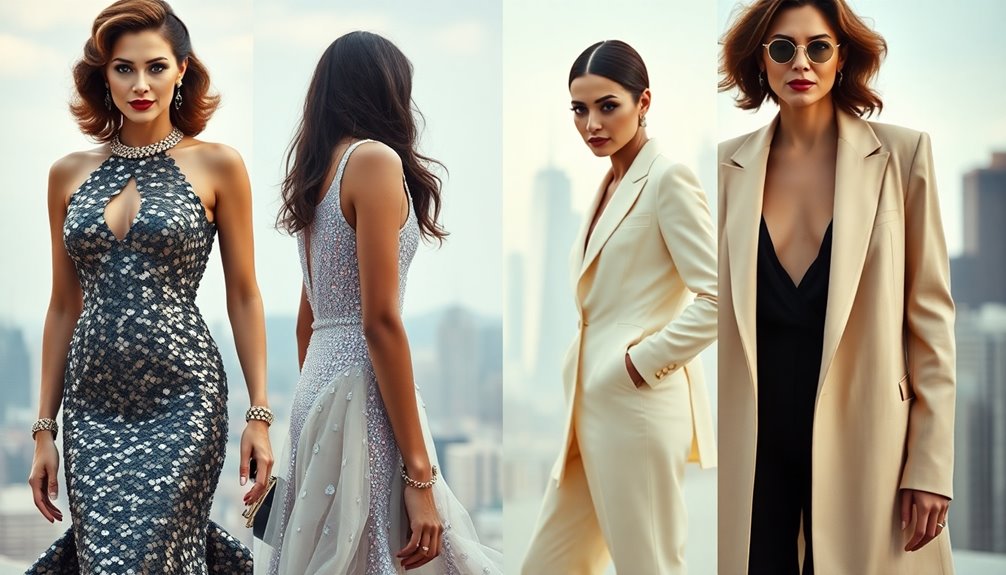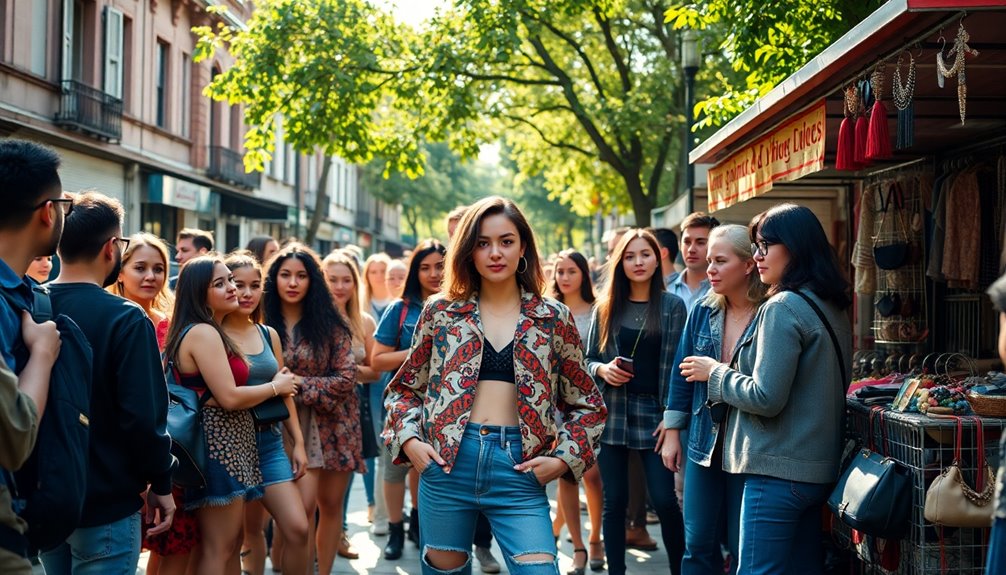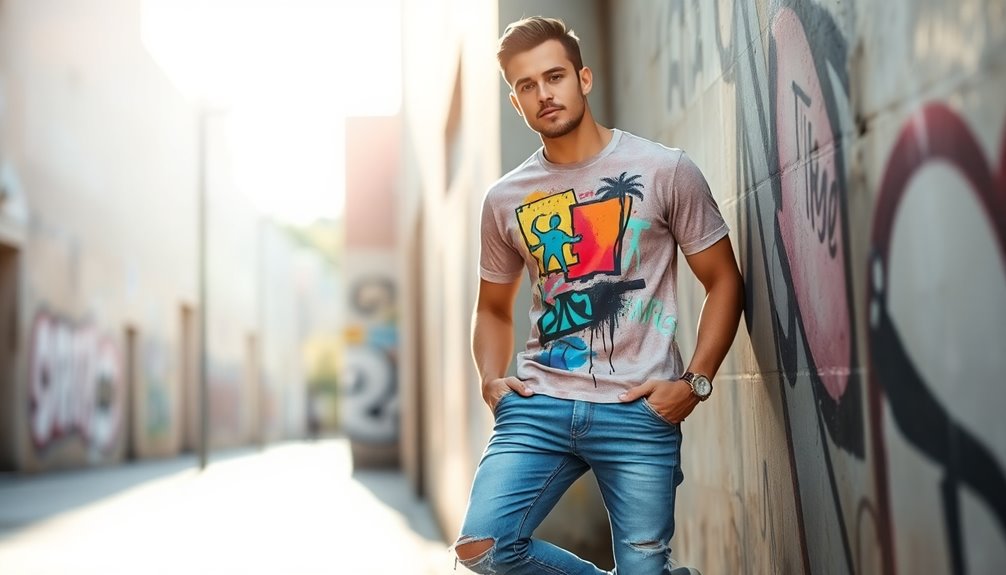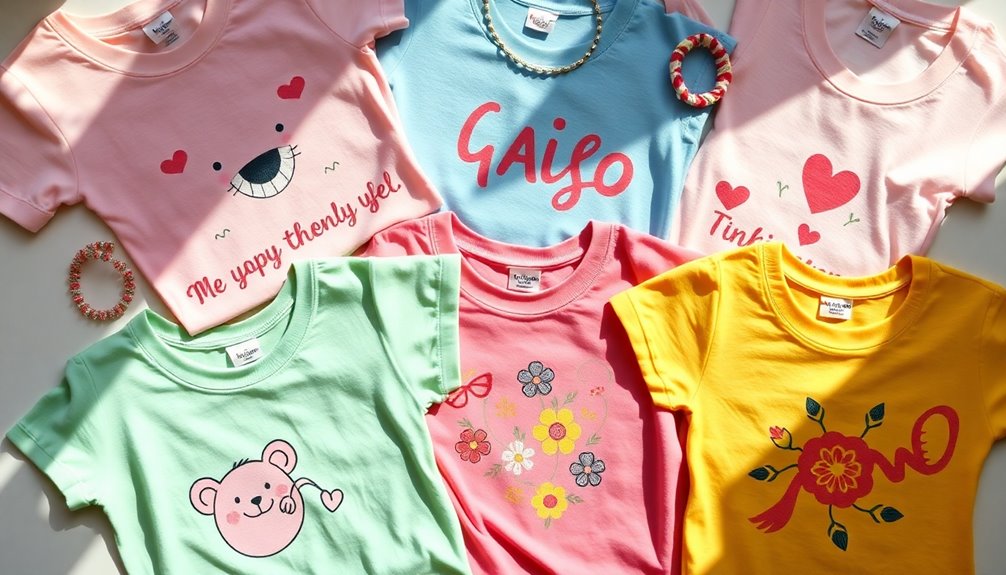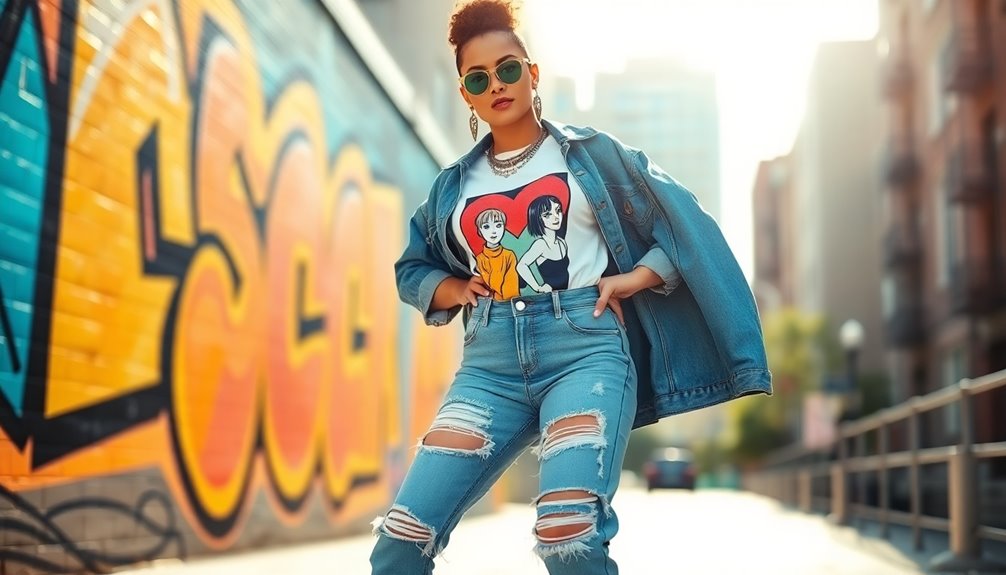Fashion influencers are transforming the industry by steering trends and promoting sustainable practices. You're likely to find that 86% of consumers trust their recommendations, making influencers pivotal in shaping purchasing decisions. They engage audiences authentically, guiding them toward ethical brands and eco-friendly options. On platforms like Instagram and TikTok, influencers create viral moments that greatly impact consumer behavior. As brands increasingly rely on these partnerships, the focus shifts toward transparency and sustainability, addressing concerns about greenwashing. There's a lot more happening within this dynamic space that can shed light on future fashion trends.
Role of Fashion Influencers
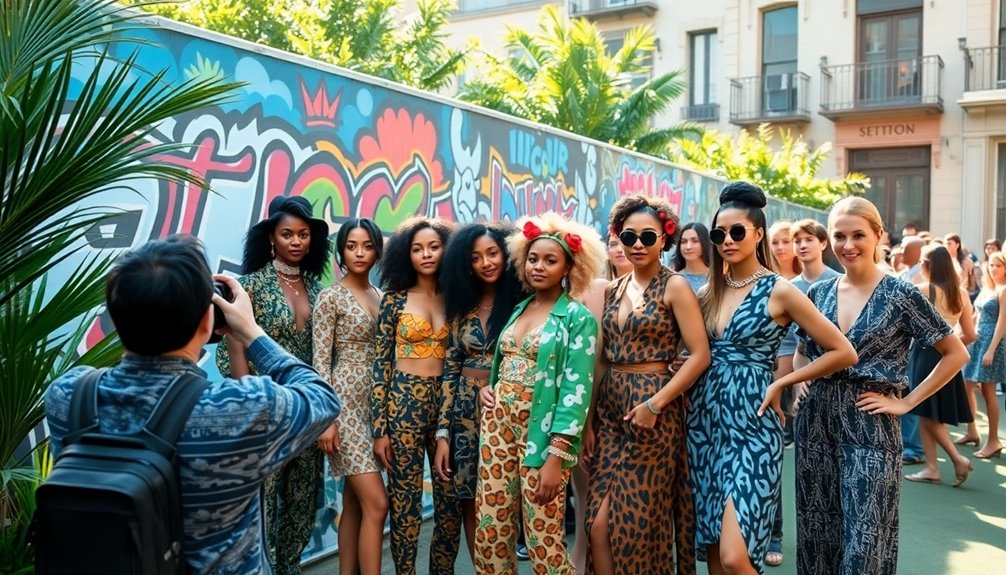
As the fashion industry evolves, you can't ignore the pivotal role fashion influencers play in shaping trends and consumer choices. Valued at $16.4 billion in 2022, the influencer market considerably impacts fashion.
Through social media platforms, influencers highlight sustainable brands, driving consumer behavior toward eco-friendly products. They educate their followers on ethical manufacturing and eco-friendly materials, empowering informed choices that prioritize sustainability.
By spotlighting brands committed to sustainable practices, influencers increase visibility for ethical alternatives, encouraging support among their audience. The rise of online communities focused on sustainable fashion underscores their ability to foster understanding and combat greenwashing.
Ultimately, fashion influencers are essential in promoting a shift toward more responsible consumption in today's fashion landscape.
Educating Audiences on Sustainability

While many consumers may not realize it, fashion influencers are essential in educating audiences about sustainability. They highlight the importance of sustainable practices, guiding you toward eco-friendly brands that align with ethical values.
With 86% of consumers taking their recommendations seriously, influencers greatly shape your purchasing decisions. By discussing the environmental impacts of fast fashion, they empower you to make informed choices that foster a culture of sustainable consumption.
Influencers also spotlight brands that prioritize sustainability, increasing visibility for ethical fashion alternatives. This growing online community encourages transparency and accountability in brand partnerships, helping you navigate the complexities of greenwashing.
Ultimately, these influencers play a vital role in shaping a more conscious consumer mindset in the fashion industry.
Promoting Ethical Brands
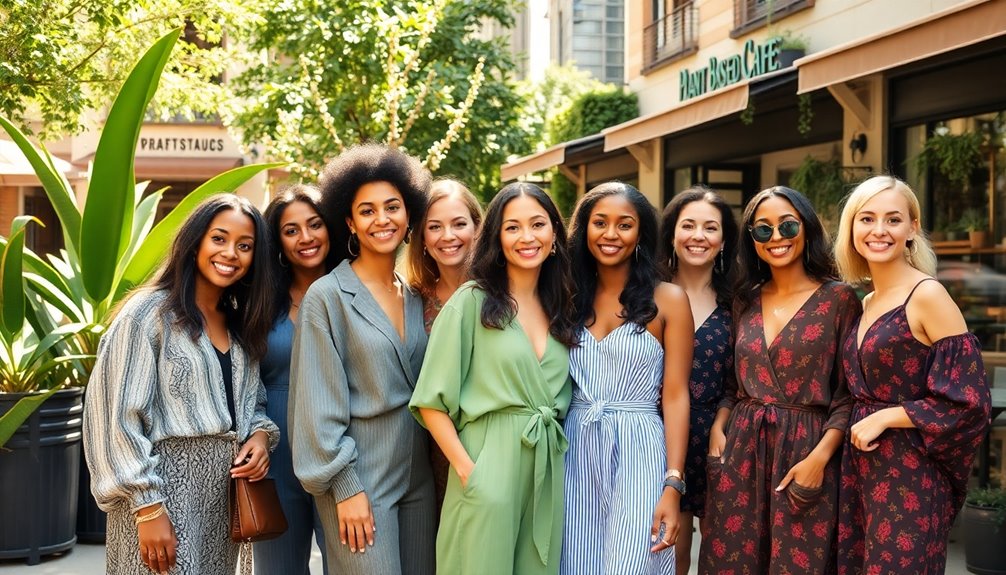
Fashion influencers are increasingly pivotal in promoting ethical brands, spotlighting those that prioritize sustainable practices and eco-friendly materials. By collaborating with these brands, influencers enhance visibility for eco-conscious products, inspiring you to support companies committed to ethical manufacturing processes.
They share personal stories that highlight the environmental impact of fast fashion, empowering you to make informed purchasing choices. With 86% of consumers purchasing items based on influencer recommendations, their role in shaping ethical consumption habits is undeniable.
Additionally, influencers advocate for transparency and accountability, helping you navigate potential greenwashing and ensuring trust in the brands they promote. By following these influencers, you can actively participate in the shift towards sustainable fashion and contribute to a more responsible industry. Furthermore, many influencers emphasize the importance of diversifying investments to support brands that prioritize sustainability and ethical practices.
Challenges in Influencer Marketing
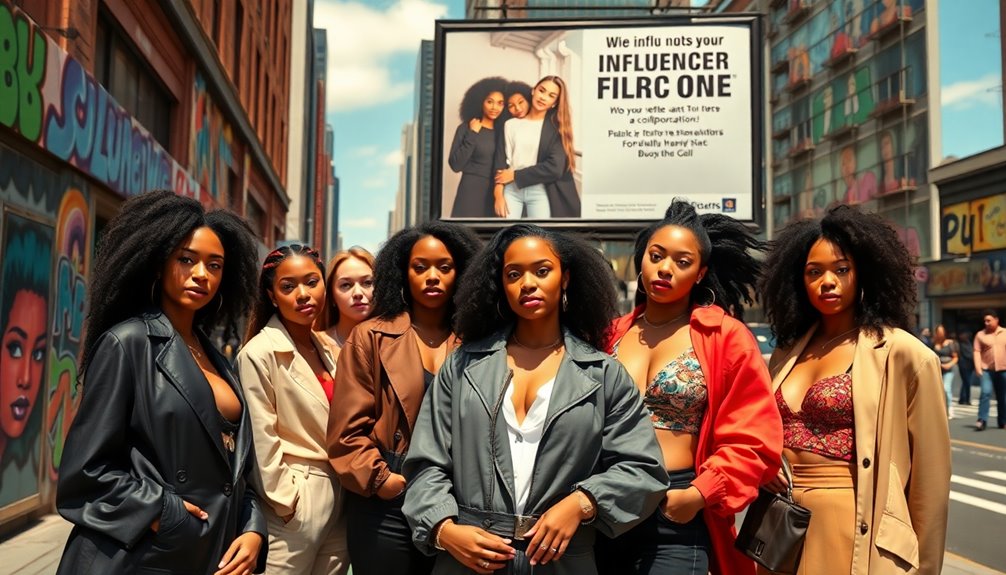
Despite the growing influence of social media, challenges in influencer marketing persist, particularly concerning authenticity and transparency. One major issue is greenwashing, which misleads consumers about brands' environmental practices and undermines genuine sustainability efforts.
As 60% of consumers demand greater accountability, influencers face increasing scrutiny over their content's authenticity. Critics argue many promotions lack genuine connection to the products.
The rise of micro-influencers adds another layer of complexity; while they often have closer ties to niche audiences, brands must invest more effort to maintain engagement.
Balancing digital fame with traditional industry standards complicates strategies, as you must adapt to evolving consumer expectations. Addressing these challenges is essential for effective influencer marketing today. Moreover, the importance of authenticity and transparency in influencer collaborations can significantly impact consumer trust and brand loyalty.
Impact of Social Media Platforms

As social media continues to evolve, platforms like Instagram, TikTok, and Pinterest have become essential tools for shaping fashion trends. Instagram leads the charge for authentic fashion content, while TikTok's short videos create viral moments with ease. You see influencers leveraging these platforms to connect directly with you, influencing your consumer behavior and brand loyalty. Pinterest, with its growing focus on sustainable fashion, showcases how these platforms cater to your eco-conscious choices.
| Platform | Impact on Fashion |
|---|---|
| Authentic content drives trends | |
| TikTok | Rapid trendsetting through virality |
| Visual discovery of sustainable options | |
| Influencers | Engage and influence purchasing decisions |
These dynamics illustrate the profound impact social media has on today's fashion landscape.
Diversity and Inclusivity Trends

You're seeing fashion influencers break beauty stereotypes and push for inclusive representation that resonates with diverse audiences.
This shift not only celebrates various body types and ethnicities but also fosters genuine connections between brands and consumers.
As you engage with this content, you'll notice how authenticity and relatability are becoming essential in shaping today's fashion landscape.
Breaking Beauty Stereotypes
In a world where beauty standards have long been dictated by narrow ideals, influencers are redefining what it means to be beautiful by embracing diversity and inclusivity.
By showcasing various body types and ethnicities, they're challenging traditional beauty stereotypes that dominated fashion marketing. You might've noticed that consumers are increasingly demanding this shift—60% of people value diverse representations in brand content.
Social media platforms amplify this trend, allowing influencers to connect with audiences in relatable ways. This approach not only enhances audience engagement but also increases brand loyalty.
As a result, you see a more empowered consumer base, with 30% drawing inspiration from both influencers and classic fashion icons, highlighting a significant change in consumer behavior toward inclusivity. Moreover, the emotional bonds cultivated through these connections can transcend traditional marketing approaches, fostering a deeper relationship between brands and their consumers.
Inclusive Fashion Representation
With the rise of social media, fashion influencers are driving a significant shift toward inclusive fashion representation that celebrates diversity.
You'll notice that influencers of various body types and ethnicities are reshaping the fashion industry, promoting beauty that reflects real life. This growing trend isn't just a passing phase; a study shows 60% of consumers value diversity in brand content.
- Influencers challenge traditional marketing norms
- Authentic imagery replaces airbrushed models
- Diverse narratives enhance audience engagement
- Inclusivity fosters deeper brand loyalty
As influencers highlight diverse representations, they break down stereotypes and create a richer, more inclusive fashion landscape that resonates with everyone.
Embracing this change is essential for the future of the industry.
Engaging Diverse Audiences
How can fashion brands effectively engage diverse audiences in today's market? To truly connect, you need to embrace diversity and representation in your marketing campaigns. Influencers play a pivotal role, showcasing various body types and ethnicities that resonate with consumers. This shift not only enhances engagement but also fosters brand loyalty.
Here's how you can strategize:
| Strategy | Impact on Consumer Behavior | Example of Influencers |
|---|---|---|
| Authentic Content | Builds Trust | Amina Muaddi |
| Inclusive Imagery | Increases Representation | Nyane Lebajoa |
| Diverse Collaborations | Expands Audience Reach | Nabela Noor |
Influencers vs. Traditional Marketing
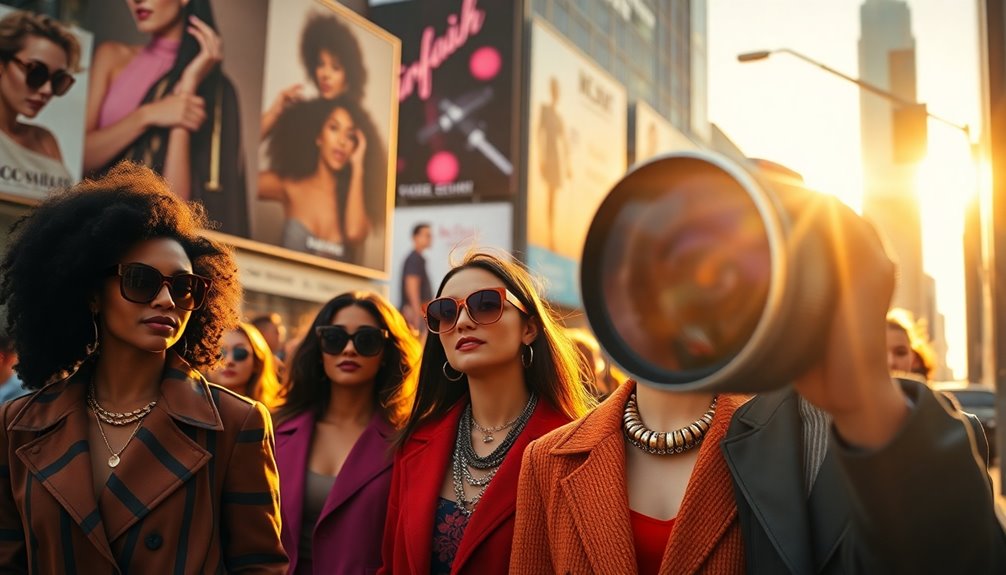
While traditional marketing relies on broad campaigns and celebrity endorsements, influencers have revolutionized the fashion industry by creating genuine connections with their audiences.
You'll find that influencers effectively shape consumer behavior through their authenticity and relatability.
Here are some key differences:
- Real-time engagement: Social media allows for instant interaction, unlike traditional marketing.
- Niche targeting: Influencers understand specific trends, tailoring brand collaborations to resonate with followers.
- Trust factor: 74% of brands see improved sales from influencer partnerships due to increased audience trust.
- Purchase influence: A staggering 86% of consumers have bought items based on influencer recommendations.
This shift highlights how influencers are becoming integral to modern marketing strategies in the fashion world.
Future Directions in Fashion

As you look ahead, it's clear that virtual shopping experiences and sustainable fashion innovations will shape the next wave of trends. Influencer collaborations are set to grow, creating unique offerings that resonate with conscious consumers. Additionally, the rise of digital platforms for personal development suggests that consumers will seek deeper connections and values in the brands they support. You'll want to stay tuned, as these changes promise to redefine how we engage with fashion.
Virtual Shopping Experiences
With the rapid advancement of technology, virtual shopping experiences are evolving into immersive environments that transform how you shop for fashion.
Augmented reality (AR) and virtual reality (VR) allow you to try on clothes before making a purchase, enhancing your confidence in purchasing decisions. Influencers are at the forefront, using these technologies on social media to showcase products in engaging virtual settings.
- Experience interactive try-ons from home
- Get real-time demonstrations from your favorite influencers
- Discover exclusive collaborations through digital fashion shopping
- Enjoy personalized interactions with brands
As younger, tech-savvy consumers increasingly embrace these innovations, influencers will continue to play a vital role in shaping the future of retail.
Sustainable Fashion Innovations
Sustainable fashion innovations are reshaping the industry by prioritizing ethical practices and eco-friendly materials, making it easier for you to make conscious choices.
Influencers are spotlighting sustainable brands, driving your interest towards ethical alternatives while educating you about the environmental impacts of fast fashion.
With the influencer market valued at $16.4 billion in 2022, their power in promoting sustainability is undeniable.
Initiatives like OFFPRICE's Sustainable Style Assurance emphasize recyclability and product longevity, showcasing influencers' ability to advocate for meaningful change.
As the online community of sustainable fashion enthusiasts grows, these influencers help you develop better consumption habits, empowering you to support brands that align with your values and foster a healthier planet.
Influencer Collaborations Growth
The rise of sustainable fashion has paved the way for a booming trend in influencer collaborations, transforming how brands connect with consumers.
You'll notice that 65% of fashion brands partnered with influencers last year, greatly enhancing their visibility and authenticity. These collaborations have led to a 74% increase in sales, showing their powerful impact on consumer behavior.
Key trends shaping this growth include:
- Co-creating collections with influencers for tailored offerings
- Increased engagement through micro-influencers with niche audiences
- Exclusive partnerships between influencers and luxury brands
- Authentic connections that attract new consumer demographics
As this trend continues, expect influencer collaborations to redefine the landscape of fashion marketing and deepen brand-consumer relationships.
Frequently Asked Questions
How Are Influencers Reshaping the Fashion Industry?
Influencers are reshaping the fashion industry by leveraging social media to create authentic connections with you and other consumers.
You're likely influenced by their recommendations, often leading to purchases based on what they showcase. They also promote sustainability, educating you on eco-friendly practices.
With micro-influencers highlighting niche trends, you gain access to diverse styles. This rapid trend dissemination helps you stay updated, making fashion more accessible and engaging than ever before.
How Is the Fashion Industry Doing Right Now?
The fashion industry's thriving right now, valued at about $1.5 trillion and projected to grow further.
E-commerce sales are booming, making up over 25% of the market.
Consumers are increasingly leaning towards sustainable and ethical brands, with searches for eco-friendly options skyrocketing.
You'll notice a push for diversity and inclusivity, as brands adapt to meet the demands of consumers prioritizing varied representations in marketing.
How Has Social Media Changed the Fashion Industry?
Did you know that 86% of consumers have bought items based on influencer recommendations?
Social media has transformed the fashion industry by making trends accessible in real-time. Instead of flipping through magazines, you're now scrolling through platforms like Instagram and TikTok for inspiration.
Influencers play a vital role in this shift, quickly spreading styles and encouraging you to adopt new looks. This rapid exchange has reshaped how you discover and engage with fashion.
How Have Influencers Changed Society?
Influencers have greatly changed society by altering how you perceive trends, beauty, and authenticity. They create relatable content that resonates with you, making fashion feel more accessible.
Their diverse representations challenge traditional norms, empowering individuals to embrace their unique styles. You're more likely to trust peer recommendations over traditional ads, driving a shift in consumer behavior.
This shift fosters a sense of community, as you connect with like-minded individuals through shared fashion experiences.
Conclusion
To sum up, fashion influencers are redefining the industry by championing sustainability and inclusivity while challenging traditional marketing methods. Did you know that 49% of consumers rely on influencers for purchasing decisions? This statistic highlights their growing power in shaping trends and brand perceptions. As you navigate the fashion landscape, keep an eye on these influencers; they're not just promoting styles but also driving meaningful change in how we think about fashion.
